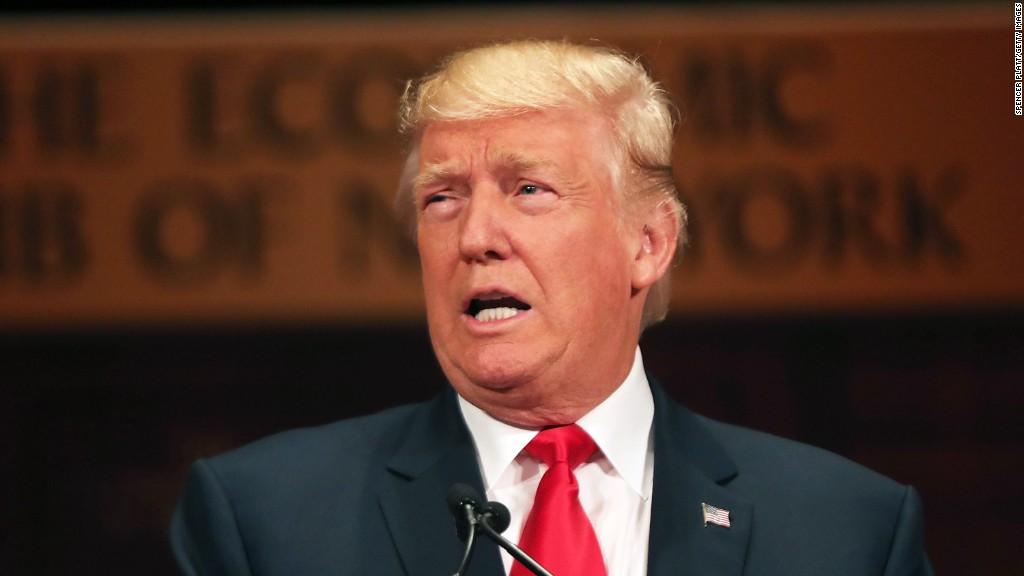
Donald Trump may be the "king of debt," but his economic advisers say he'll balance the budget in the White House.
Trump plans a massive tax cut for individuals and businesses. It's how he would boost America's sluggish growth. But slashing taxes comes at a cost: the government doesn't take in as much money. The non-partisan Tax Foundation estimates his proposal will reduce government revenues by between $2.6 trillion and $3.9 trillion in the next decade.
But Trump's advisers -- economist Peter Navarro of the University of California-Irvine and private equity investor Wilbur Ross -- say it will be easy to balance the budget.
"The Trump economic plan is much more than just about taxes," Navarro and Ross write in a new analysis released late Sunday night. They argue that groups like the Tax Foundation don't look at the full policy picture.
Trump can balance the budget by doing the following, they claim:
1. Cut government regulations by 10% (details aren't given on which regulations)
2. Eliminate America's $500 billion trade deficit (by renegotiating deals)
3. Expand U.S. energy production (by allowing more drilling and more coal burning)
Related: 2016 is the 'lesser of two evils' election
Trump's plan: is it fiscally conservative?
Once Trump gets these three items done, his economic advisers believe tax revenues will increase because more Americans will have jobs and businesses will generate more profits. They call the overall plan "fiscally conservative" and say it "approaches revenue neutrality."
The campaign's estimates may be very optimistic, according to other experts who have looked at Trump's plans.
For example, the Tax Foundation says the tax plan alone could cost as much as $3.9 trillion, if all businesses -- big and small -- get taxed at the lowest 15% rate that Trump has proposed. This estimate includes the plan's effect on U.S. economic growth.
"Even if you go to $3.9 trillion number, you are still only a trillion off, which given the size of the U.S. budget is still fiscally responsible," Navarro told CNNMoney. He pointed to how the debt doubled from about $10 trillion to nearly $20 trillion during the Obama administration.
But many businesses leaders and experts say Trump's plans would be a disaster for the economy, sending the U.S. plunging into a recession and running up the debt.
Related: Trump supporters want his tax returns released
Critics say Trump's plan would be a disaster
Doug Holtz-Eakin, head of the American Action Forum and a former economic adviser to Republican John McCain, has called Trump's plans "wildly implausible at best."
Oxford Economics says Trump's economic, tax and immigration policies would cost 4 million jobs, spark a trade war and tank the American economy.
Moody Analytics says Trump's plans will kill 3.5 million jobs and cause a recession that would last longer than the Great Recession. Moody's is especially critical of Trump's plan to deport 11 million undocumented immigrants, which Moody's says would hurt the economy.
Republican business leaders Mitt Romney and Meg Whitman say Trump is a "phony" who will sink the economy by causing a trade war, increasing the debt and constantly saying things that alarm businesses and foreign governments.
Related: 'President Trump': A regulation killer and creator
It's all about the details
The latest analysis from Trump's economic team doesn't mention anything about immigration. It doesn't address how the country would pay for mass deportations or how the economy would deal with the loss of so many workers in a short time frame.
"We see that as a wash in terms of economic impact," Navarro says.
It also doesn't mention the fact that oil and gas prices are already at very low levels. Lowering them more has actually been a negative for the economy in recent months since energy companies can't make money when the price falls below $40 to $50 a barrel (oil is currently trading in that range).
As for claims that Trump would start a trade war with his plans to put hefty tariffs on goods coming from China, Mexico and elsewhere, his economic advisers argue that America is already in one.
"Those who suggest that Trump trade policies will ignite a trade war ignore the fact that we are already engaged in a trade war. It is a war in which the American government has surrendered before engaging," write Navarro and Wilbur.


